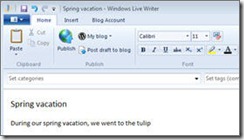Windows Live Writer and myElectrical
 When adding a note to our site we have a great online WYSIWYG editor and things are pretty simple. However, if you prefer you can write, manage and publish your posts using any external editor which implements the MetaWeblog API. A popular free post editor is Microsoft’s Windows Live Writer.
When adding a note to our site we have a great online WYSIWYG editor and things are pretty simple. However, if you prefer you can write, manage and publish your posts using any external editor which implements the MetaWeblog API. A popular free post editor is Microsoft’s Windows Live Writer.
Windows Live Writer is a commonly used and preferred by many bloggers for writing and managing their posts. Besides the standard windows type feel, it is also offline. You can put together your post without worry about session timeouts and then publish it in one click when finished.
Being compatible with the MetaWeblog API, whatever you write in Live Writer can be published to any blog which implements the API (including myElectrical). This does enable some bloggers to post on multiple blogs easily.
Setting Up
Setting up Live Writer to connect to myElectrical is easy (and you only need to do it once). You will need your user name and password, and when requested for the blog URL, it is:
http://myElectrical.com/DesktopModules/SunBlog/MetaWeblog.ashx
When you are asked for the blog type, select MetaWeblog API, select Notes and you’re done.
You can now write, manage and publish your post using Live Writer. As proof, I’ve put this post together in Live Writer.